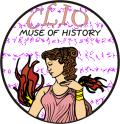HISTORIANS

No matter what else has been happening in my life, I have always enjoyed reading history. A bit like Condorcet, who, while in prison awaiting the guillotine, rejected the consolations of religion in favor of those of history and wrote The Outline of a Table of Progress of the Human Spirit. As I too am devoutly secular I find the analogy amenable.
As my mother lay fatally ill (I was seventeen), I buried myself in James McKee’s Civil War Narrative of the Surrender of U.S. Forces at Fort Fillmore, New Mexico. That was at the start of a lifetime love affair with the history of the American westward movement. Later, Gibbon’s Decline and Fall of the Roman Empire kindled my love of the panoramic ethos of the “big” history. (I never came close to finishing it, though I intend to someday.) I began reading Parkman’s Conspiracy of Pontiac right after my infant daughter died. Lately, I’ve gone back to Macaulay’s Essays. I am always working on Carr’s History of Soviet Russia (I’m up to volume 5), and, of course, Marx is never far away. Although rarely remembered as a historian, he was perhaps the most history-conscious of modern philosophers and indeed remains indispensable as a primary source in the history of political economy.
I also love reading about history; that is, the history of history-writing, or historiography. Here, I am for once the “professional” historian’s ideal audience. Why? Well, for one thing, I readily engage with the subject. Secondly, I am not encumbered by academic position, and thus am no threat. I have no awards or prizes to garnish, no tenure to win, no feckless constituencies to amuse. Most important, I am easily inspired. The dreariest historian can for me excite possibilities and provoke new thoughts. And anyone who has read, say, J.H. Hexter, or Norman Stone, or any of the vast host of academic disciples and imitators will know that this is not always easy.






I mention Hexter because he did introduce me, via a collection of essays, Doing History, to my all-time favorite, E H Carr, someone he heartily depised and whom, partly as a result, I came to greatly respect and admire. So, thank-you, Professor Hexter, in whatever form you may be inhabiting nowadays.
Speaking of Carr, whose What Is History? and The New Society have been profoundly welcome influences in my life; all of my favorites among the practitioners of the historian’s craft have worked outside of academic departments of history. Of course, most of those I admire were not professional historians at all. And most of them practiced long before there existed that bloodless race. They ran the gamut of callings. Men of politics (Tacitus), men of God (Bede), journalists (Gibbon), men of letters (Macaulay), and scientists (Joseph Needham). Even Carr himself, though finally ensconced during his later years in a fellowship at Trinity College, Cambridge, began his career as a diplomat followed by a stint, during the Second World War, as the assistant editor of the London Times.
There is sadly a lack of good working-class historians (aside from Marx and Engels), a lacunae that in our own age at least is quite galling, given the profusion of “working class studies” spawned by university bureaucracies. Carr and Needham were very sympathetic to Marx and this more or less extended to regimes ruling in his name, but neither focused on the working class as such. There are of course the pedestrian studies of E P Thompson and Ralph Miliband, but neither they nor their contemporaries or successors can be called first-class practitioners of the historian’s art.
So, why in fact is there no George Bancroft or Francis Parkman of the working class? No first-class literary chronicle of the Haymarket Riots, or the Dearborn Strike, or industrial organizing in the South? No comparable modern complement of Engels on Manchester’s working class or Marx on the Paris Commune? Could a William Hickling Prescott have written an account of Boston’s working class that would still be in print 160 years later?
“Working people never did anything.” That from one of my professors at Harvard, a Pulitzer Prize winner and a writer of fair repute. That pretty much sums up the attitude of the shining lights at the apex of the American historical profession. But, of course, there is more to it than that. A number of things killed, finally, the art of history; capitalist mass education, political correctness, the decline of language, identity politics, and other culprits too numerous or too impolitic to mention.
Does it matter? Perhaps not. History in the end is nothing more than what those in power say it is. Our rulers now promote a way of thinking about the past that is itself rapidly passing into history; its successor, under new dispensations, will in time redefine not only the future but, as a natural and necessary pre-requisite, history itself.
In the meantime, it is good for Marxists to go on reading and absorbing the wisdom of a Tacitus (read enough of him and you can gain a real sense of such modern writers as Berlin and Arendt and the employment of the “moral voice” for rational purposes; in their case, the revival of Jewish capital in the immediate post-Holocaust era and the legitimacy of Israel) or a Gibbon (a modern secular critique of religion, which he pioneered, is long overdue; his Decline is must reading for students of the American Revolution). The devout Bede is a venerable lesson in the opacities of human character under the most adverse conditions. Even Macaulay’s 19th century essays throw new light on our own vexing dilemmas, free from the cant of modern “democracy” and the despairing ennui of its bifurcated citizenry. He stated the case for an industrializing British empire without squeamishness. And echoed Marx in his dismissal of “humanitarian” prescriptions for reform. Macaulay has a good deal to say not so much about “human nature”, but the contexts in which that nature is lived out and experienced.
Which, as history tries to tell us, is the beginning of wisdom.
.